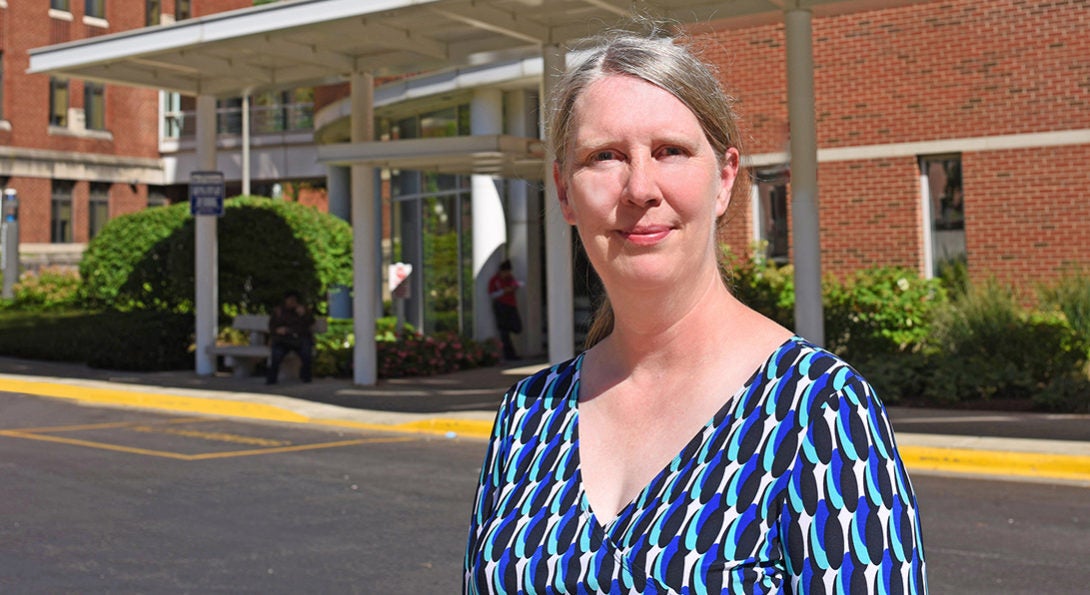Doorenbos co-leads team tackling opioid use among kidney patients

UIC is one of eight clinical centers studying alternative pain management solutions for adults on maintenance dialysis Heading link
The University of Illinois at Chicago has received $2.8 million in funding from the National Institutes of Health to investigate non-opioid pain management strategies for people with kidney disease, which affects about 15% of adults in the U.S.
Co-principal investigators on the grant are Nursing Collegiate Professor Ardith Doorenbos, PhD, RN, FAAN, and UIC professor of medicine Michael Fischer.
With the funding, UIC will be one of eight clinical centers studying alternative pain management solutions for adults on maintenance dialysis — a treatment that can help patients live for years, even though there is no cure for end-stage renal disease.
What they learn could have a ripple effect on other populations affected by the opioid epidemic.
“We want to be more mindful and concerned about the opioids prescribed to hemodialysis patients so we can give them better quality of life,” said Doorenbos. “If effective, we’re hopeful these non-pharmacological strategies could be applicable beyond kidney disease patients to other populations affected by the opioid epidemic.”
Finding less risky treatments
Fischer said that as many as one-third of dialysis patients use opioids, a rate that is about three times higher than the general population.
“These patients desperately need relief from pain, and it is vital that we find new, better, less risky treatments,” said Fischer, professor of medicine at the College of Medicine.
Opioid use can diminish the quality and even hasten the end of a patient’s life, Doorenbos said. Opioids have been associated with an increased risk of falls, impaired cognition, hospitalization and death, she said.
In 2017, the U.S. Department of Health and Human Services declared the opioid epidemic a public health emergency, citing skyrocketing rates of death directly attributable to opioid drug overdose.
Fischer and Doorenbos will lead a multidisciplinary team of experts at UIC and will coordinate with the other clinical centers and the data coordinating center working on the project, forming the Hemodialysis Opioid Prescription Effort, or HOPE, Consortium. Over the course of five years, the consortium will identify promising interventions and test them in clinical trials. The interventions, which will be identified in the first year of the project, potentially include cognitive behavioral therapy and other non-opioid medications.
“Chronic pain in dialysis patients generally has diverse causes, so multi-pronged strategies will likely be needed to improve the situation,” said Fischer, who is a nephrologist at UI Health, UIC’s clinical health enterprise, and renal section chief at the Jesse Brown VA Medical Center.
“Our goal is to find an effective, integrated approach to pain management,” said Doorenbos, a registered nurse and director of palliative care at the University of Illinois Cancer Center.
The HOPE Consortium, which is a program of the National Institute of Diabetes and Digestive and Kidney Diseases, hopes to enroll patients from across the nation into multi-site clinical trials.
The funding for this project is provided by the NIH as part of its Helping to End Addiction Long-term Initiative, or NIH HEAL. The initiative aims to improve prevention and treatment strategies for opioid misuse and addiction and to enhance pain management. UIC’s award is one of 375 grant awards across 41 states announced last week by the NIH in 2019.
“It’s clear that a multipronged scientific approach is needed to reduce the risks of opioids, accelerate development of effective non-opioid therapies for pain and provide more flexible and effective options for treating addiction to opioids,” said NIH Director Dr. Francis S. Collins, who launched NIH HEAL in early 2018. “This unprecedented investment in the NIH HEAL Initiative demonstrates the commitment to reversing this devastating crisis.”